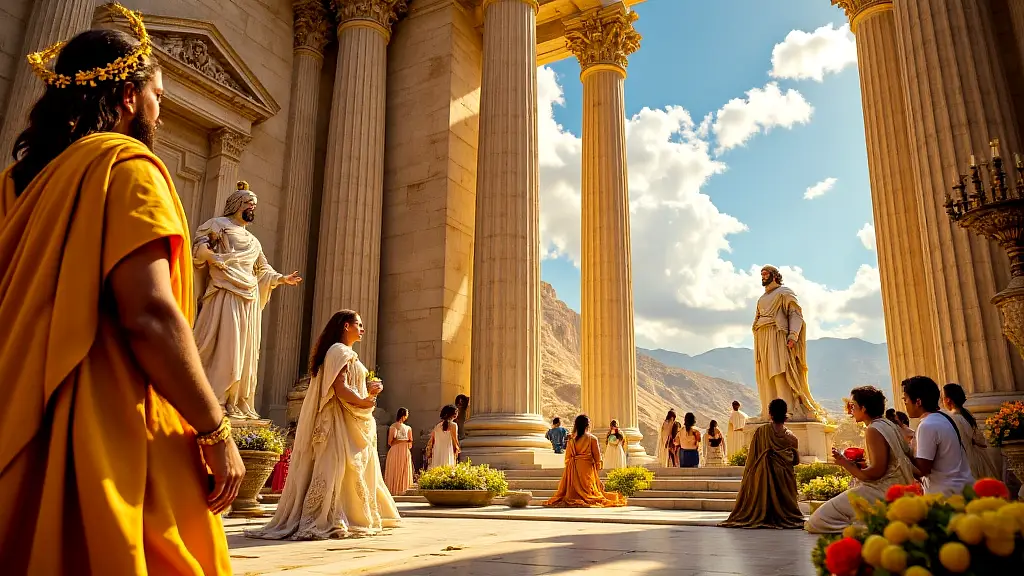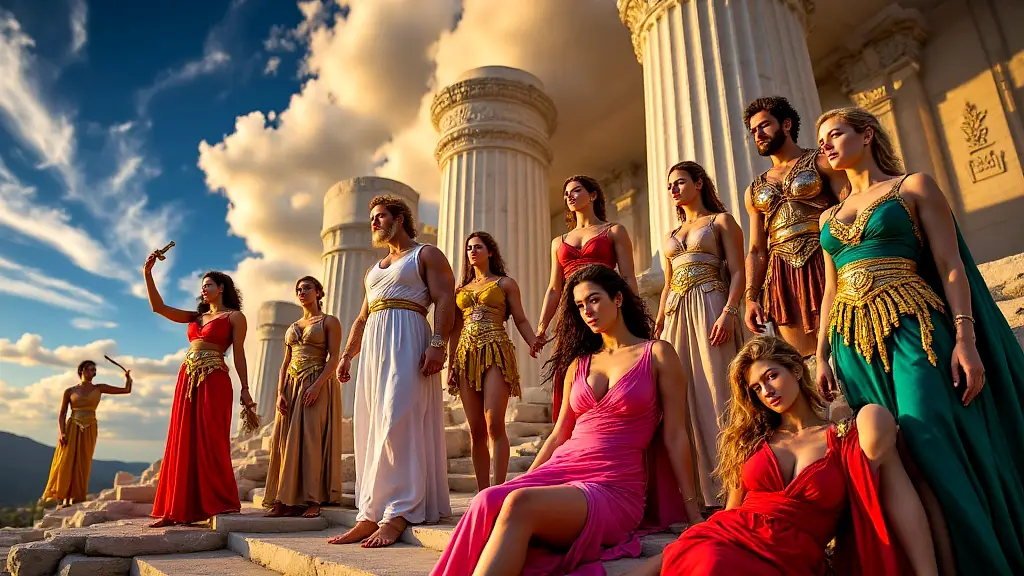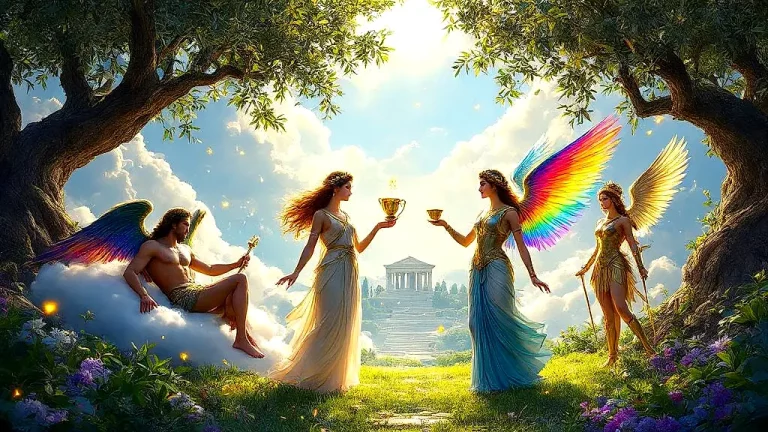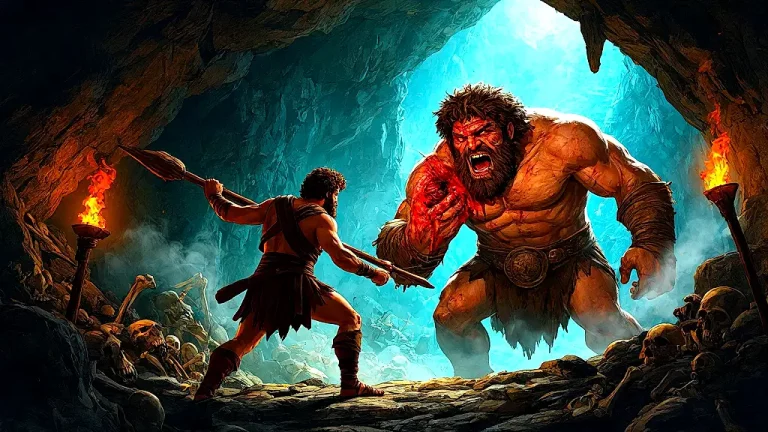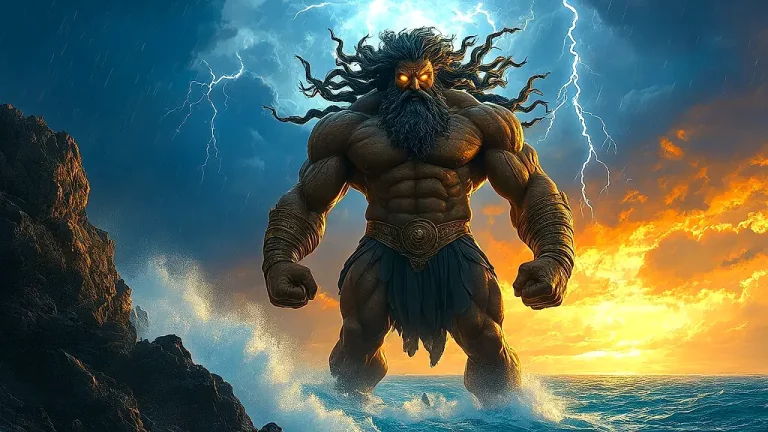Meet The Olympian Gods and Goddesses Of Greek Mythology
Picture a group of incredibly powerful beings, each controlling different parts of existence like storms, love, or the oceans. These were the Olympian gods of Greek mythology. They weren’t just characters in old stories. Instead, they helped ancient Greeks explain everything from natural disasters to personal luck.
Key Points:
- The Olympian gods ruled ancient Greece, controlling things like storms, love, and the sea.
- Zeus became king after beating the Titans in a big war, then split power with Poseidon and Hades.
- Athena won Athens by giving an olive tree, while Poseidon made a saltwater spring.
- Hera often got angry at Zeus’s other lovers and their children, like Heracles and Apollo.
- People worshipped the gods with temples, sacrifices, and oracles like Delphi’s Pythia.
- Greek gods were different from Norse and Egyptian ones—like being immortal or having mixed roles.
- Some gods, like Hestia and Dionysus, swapped places in the main 12 depending on the story.
You probably know Zeus, the king who controlled lightning, or Athena, the goddess of wisdom. But their myths are more complex than most people realize. In this guide, we’ll look at how the Olympians took power. This involved a brutal war against the Titans, their predecessors. We’ll also explore their complicated relationships and why cities like Athens built huge temples for them.
As we go further, you’ll also see how these myths changed depending on the region. For example, was Dionysus, the god of wine, really one of the 12 Olympians? The answer varied. Whether you’re new to mythology or refreshing your knowledge, this will help you understand the stories that influenced ancient Greece.
Olympian Gods and Goddesses: Overview and Key Facts
| Greek Name | Domain | Symbols | Roman Equivalent | Key Notes |
|---|---|---|---|---|
| Zeus | Sky, Thunder, Kingship | Lightning bolt, eagle, oak tree | Jupiter | King of the gods, who overthrew the Titans. Famous for having numerous romantic relationships. |
| Hera | Marriage, Family, Queenship | Peacock, pomegranate, cow | Juno | Hera was both Zeus’ wife and sister, and she was extremely protective when it came to his affairs. |
| Poseidon | Sea, Earthquakes, Horses | Trident, horse, dolphin | Neptune | Poseidon governed the seas and could create storms or calm waters using his trident. |
| Demeter | Agriculture, Harvest | Wheat sheaf, torch, poppy | Ceres | She controlled the harvest, and according to myth, her grief over Persephone’s disappearance caused winter. |
| Athena | Wisdom, War Strategy | Owl, olive tree, Aegis (shield) | Minerva | She sprang fully formed from Zeus’ head and later became the patron goddess of Athens after gifting the city an olive tree. |
| Apollo | Sun, Music, Prophecy | Lyre, laurel wreath, sun chariot | Apollo | Apollo was Artemis‘ twin brother, and besides being a god of music and prophecy, he also controlled healing and archery. |
| Artemis | Hunt, Wilderness, Moon | Bow, deer, crescent moon | Diana | Artemis, Apollo’s twin sister, was the protector of young girls and wild animals. |
| Ares | War, Violence | Spear, helmet, vulture | Mars | Unlike Athena, he represented the brutal, uncontrolled side of war and often fought with other gods. |
| Aphrodite | Love, Beauty | Rose, dove, scallop shell | Venus | Aphrodite emerged from sea foam. She was married to Hephaestus, though she often had affairs, especially with Ares. |
| Hephaestus | Fire, Blacksmiths | Hammer, anvil, forge | Vulcan | The only physically imperfect Olympian, Hephaestus crafted weapons and tools for the gods. |
| Hermes | Travel, Trade, Thieves | Caduceus, winged sandals, tortoise | Mercury | Hermes served as the gods’ messenger and also guided souls to the Underworld. |
| Dionysus | Wine, Ecstasy, Theater | Grapevine, thyrsus, leopard | Bacchus | In some traditions, he replaced Hestia among the 12 Olympians. He was associated with wine, festivals, and transformation. |
| Hestia | Hearth, Home | Fire, hearth, kettle | Vesta | Hestia gave up her place among the Olympians in some versions of the myth, allowing Dionysus to join instead. |
Note: The “12 Olympians” varied by region and era. Hestia (goddess of the hearth) was sometimes replaced by Dionysus (god of wine), reflecting cultural shifts.
The Olympian Gods: Where They Came From and How They Fit Together
If we want to grasp how powerful they were, we need to follow their story. It begins with the brutal Titan War and leads to their complicated family relationships.
Meet the 12 Olympians: Who’s Who?
The Olympians formed a powerful yet often conflicted family, with each deity governing fundamental aspects of existence. Below is an essential guide to these twelve major gods, their responsibilities, and their recognizable symbols:
| Name | Domain | Symbols | Roman Equivalent | Quick Note |
|---|---|---|---|---|
| Zeus | Sky, Thunder, Kingship | Lightning bolt, eagle, oak | Jupiter | Ruler of all gods. His lightning bolts demonstrated his supreme power. |
| Hera | Marriage, Family | Peacock, pomegranate | Juno | As Zeus’s wife, she frequently acted against his lovers due to deep resentment. |
| Poseidon | Sea, Earthquakes | Trident, horse | Neptune | He controlled the seas completely, able to cause or prevent disasters. |
| Demeter | Harvest, Seasons | Wheat, torch | Ceres | Her sorrow over Persephone’s abduction explained the changing seasons. |
| Athena | Wisdom, Strategic War | Owl, olive tree, Aegis | Minerva | She sprang fully grown from Zeus’s head and later became Athens’ protector. |
| Apollo | Sun, Music, Prophecy | Lyre, laurel wreath | Apollo | Artemis’s twin brother who delivered prophecies at Delphi. |
| Artemis | Hunt, Wilderness | Bow, deer | Diana | Apollo’s twin sister who guarded young women and wild creatures. |
| Ares | Violent War | Spear, helmet | Mars | Unlike Athena’s strategic warfare, he represented brutal combat. |
| Aphrodite | Love, Beauty | Rose, scallop shell | Venus | She emerged from sea foam and influenced both divine and mortal relationships. |
| Hephaestus | Fire, Craftsmanship | Hammer, anvil | Vulcan | The only Olympian with physical impairments, yet he crafted magnificent weapons. |
| Hermes | Travel, Messengers | Caduceus, winged sandals | Mercury | The gods’ primary messenger who also escorted souls to the afterlife. |
| Dionysus* | Wine, Ecstasy | Grapevine, thyrsus | Bacchus | Later traditions sometimes included him instead of Hestia among the twelve. |
Note: Hestia (goddess of the hearth) originally belonged to the twelve Olympians, but Dionysus often replaced her in later accounts, reflecting changing religious practices.
The twelve main Greek gods each ruled over key parts of life, from Zeus’s control of the sky to Aphrodite’s power over love.
How Zeus Took Over: The Titan War
Cronus ruled during the Golden Age, but his reign depended on fear. He overthrew his father Uranus and then learned a prophecy that one of his children would overthrow him. Driven by fear of losing power, he consumed each newborn. However, his wife Rhea saved Zeus by hiding him in Crete and giving Cronus a stone instead. This clever trick made possible history’s first major overthrow of power.
When Zeus grew up, he started the Titanomachy, a ten-year war that changed everything. Key moments in the war included several decisive actions:
- Zeus freed the Cyclopes from Tartarus and gained their powerful lightning bolts
- He released the Hundred-Handed giants, who could throw mountains with their three hundred arms
- The Titans were ultimately overpowered and imprisoned in Tartarus
- As punishment, Atlas had to hold up the sky forever
After the war ended, the three brothers divided creation. Zeus took the sky and became king of gods, Poseidon claimed the seas, and Hades got the Underworld, though some stories say they agreed peacefully. Earth and Mount Olympus remained shared spaces. This established the new order where Olympians replaced Titans as rulers. Zeus’s lightning bolts became both his weapon and the symbol of his supreme authority.
The Forgotten Olympians: Hestia and Dionysus
Hestia was the peaceful goddess of the sacred hearth fire. As Cronus and Rhea’s first child, she chose to give up her place among the Olympians to tend the eternal flame at Olympus’s center. The Homeric Hymn 24 describes this selfless act, which explains why most lists of twelve Olympians don’t include her. Excavations reveal her altars always stood at city centers.
This shows people valued her role in daily life more than her appearances in stories.
Dionysus presents a different situation. He joined the Olympians later than others. His inclusion shows how Greek culture changed over time:
- Late arrival: Most myths say Zeus gave birth to him from his thigh
- Growing influence: His worship expanded as wine trade increased during the 8th century BCE
- Dual role: As god of ecstasy, he connected the gods’ world with the underworld
- Local differences: Some places like Athens still counted Hestia among their twelve gods
The Orphic tradition gave Dionysus special importance, sometimes claiming he would succeed Zeus. This idea would have surprised early Greeks who knew the original myths.
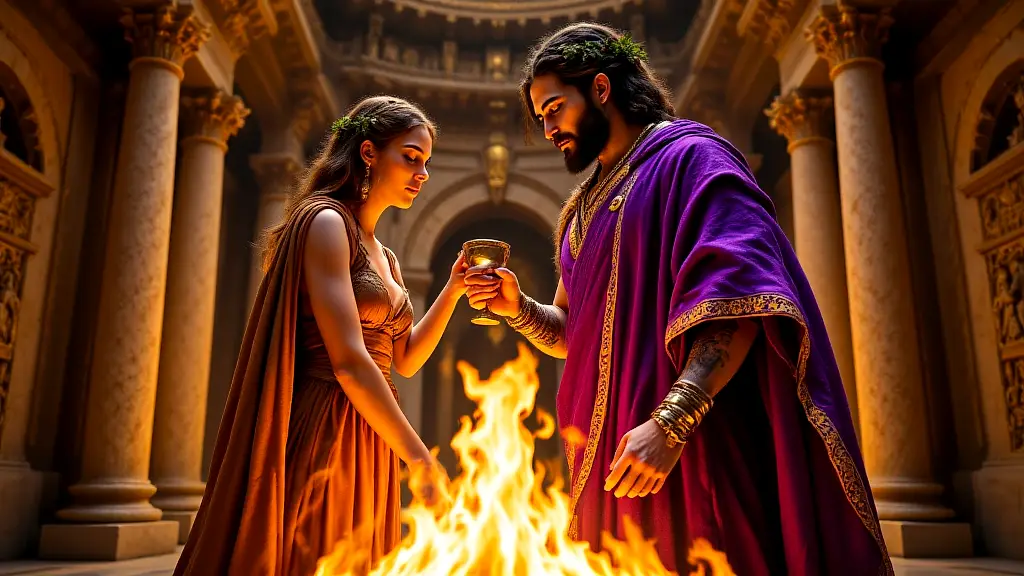
The Big Gods and Their Stories
Now that you know the Olympians, we’ll examine the myths that shaped their reputations. Now we’ll look at Zeus’s many love affairs and Athena’s famous conflicts with other gods.
Zeus: Lightning, Love Affairs, and Keeping Order
Zeus had numerous and unusual relationships with mortals. When he approached Leda, Queen of Sparta, he transformed into a swan. Some stories say she agreed, others disagree. Their children included Helen of Troy and the Dioscuri twins, showing how Zeus’s actions often started important myths. He used different forms for these encounters:
The story of Prometheus shows Zeus’s harsh punishment. After the Titan gave fire to humans, Zeus chained him to a rock. Every day, an eagle ate his liver, which grew back each night. This wasn’t just about cruelty – it proved Zeus’s supreme power. Meanwhile, he sent Pandora with her well-known box to humanity, creating an unexpected consequence.
In the Trojan War, Zeus acted as a strategic controller. While he claimed neutrality (as seen in Iliad Book 1), he carefully controlled what happened. He used golden scales to weigh fates, stopped other gods from interfering at times, and let Hector die to follow destiny. These actions kept order while showing that not even gods could change fate.
Athena vs. Poseidon: Who Won Athens?
Two gods competed to be the city’s patron in a contest between gods on Athens’ Acropolis. Poseidon struck the ground with his trident, creating either a saltwater spring (Apollodorus) or a seawater lake (Pausanias), showing his control over the sea. Athena answered by planting Greece’s first olive tree near the Erechtheion. This tree had three important uses:
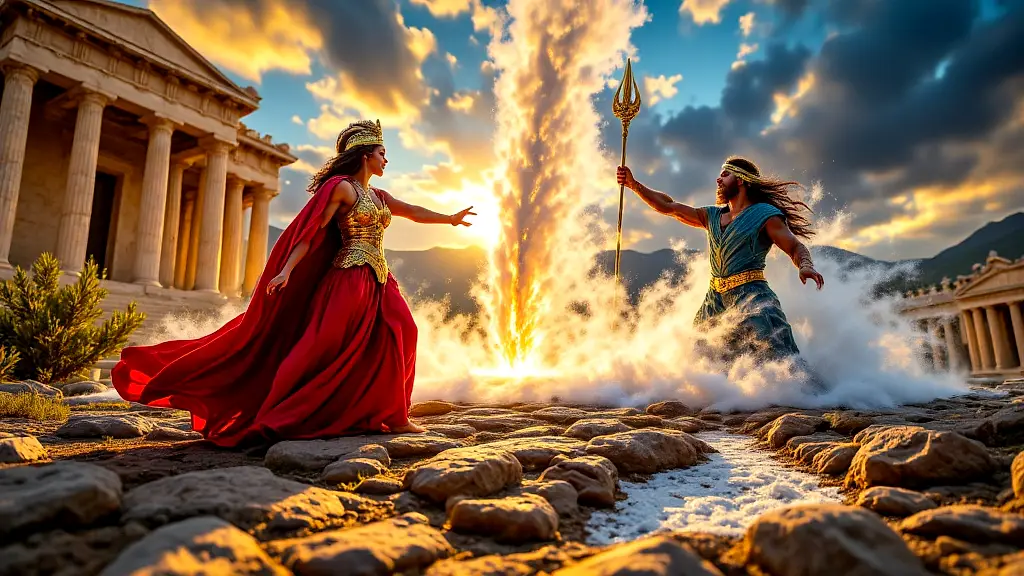
- Wood for construction and fuel
- Fruit for nutrition
- Oil for cooking, lighting, and trade
Ancient sources disagree if the spring was drinkable, but they all highlight the olive’s immediate useful value. The citizens (some say King Cecrops) chose Athena’s gift, a decision with lasting effects. Excavations show this myth’s cultural impact:
- The Erechtheion’s design honored both gods
- Olive trees were protected by death penalty laws
- Panathenaic festivals included sacred olive oil as prizes
Poseidon’s anger caused flooding in some stories. This explains why Athens later built him a temple at Cape Sounion – one that looked out over the sea he ruled.
Athena won Athens by giving them the first olive tree, which was way more useful than Poseidon’s salty water, and the city celebrated her gift for centuries.
Hera’s Revenge: Heracles and Leto’s Struggles
Hera’s anger toward Zeus’ son Heracles started before his birth. She made his mother Alcmene suffer through a long labor (Diodorus Siculus 4.9). When Heracles was eight months old, Hera sent two poisonous snakes to his crib. Yet surprisingly, the baby crushed them with his bare hands. This early sign of his future strength appears in many ancient Greek artworks.
Hera’s plan failed completely – this became Heracles’ first challenge, similar to his later Twelve Labors, which Hera later caused through a curse.
Leto faced nine months of persecution while pregnant with Apollo and Artemis. Hera made sure:
- No land would give her shelter
- The serpent Python chased her
- She had to give birth on Delos, a floating island
The Homeric Hymn to Apollo says Hera kept Eileithyia, the birth goddess, away. This made Leto suffer for nine days in labor. These events made Delos an important religious site. Later, Apollo killed Python at Delphi, using the serpent’s location for his temple.
How the Greeks Honored Their Gods
The Olympian gods appeared in stories but also played key roles in Greek society. People showed their respect through important rituals, large temples they built, and oracles that gave prophecies.
Sacred Places and How People Worshipped
Greek temples served as holy places where people connected with gods. While priests entered the inner chamber, visitors stood outside at altars for sacrifices. The Parthenon’s 40-foot Athena statue had practical uses too – workers could remove its gold covering during emergencies, showing how religion was connected to city affairs.
Builders followed specific architectural rules; the Temple of Apollo at Delphi was carefully positioned to face the Pleiades star cluster.
Daily worship combined regular practice with special ceremony. A typical ritual included:
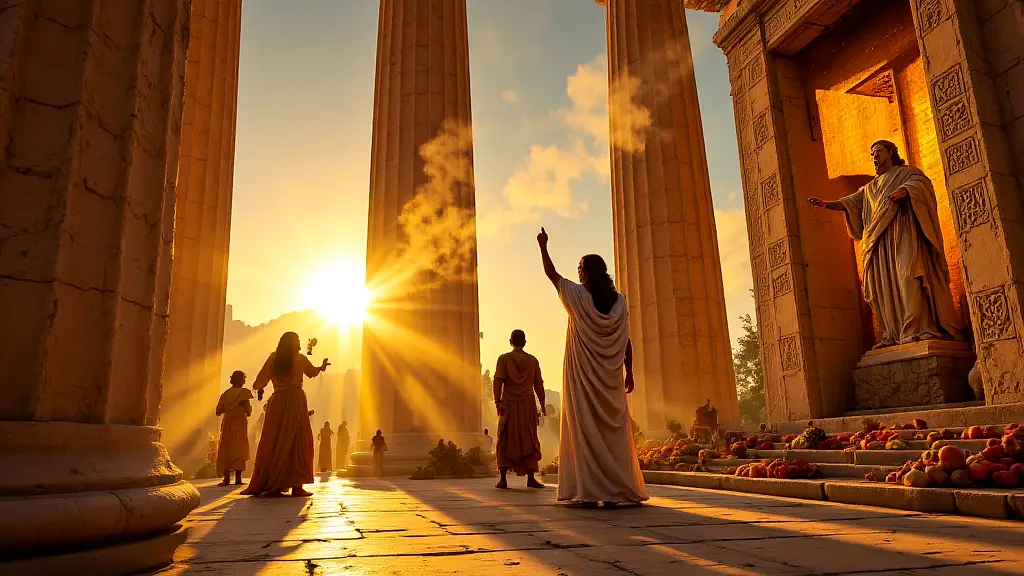
- Cleaning with water first
- Walking in procession with gifts
- Killing an animal (often a white goat or bull)
- Eating most of the meat together People believed the smoke that rose upward fed the gods.
| Temple | Location | Deity | Unique Feature | Modern Equivalent |
|---|---|---|---|---|
| Parthenon | Athens | Athena | 13m gold/ivory statue by Phidias | National monument |
| Olympieion | Athens | Zeus | Largest in Greece (104 columns) | Unfinished mega-project |
| Temple of Hera | Olympia | Hera | Olympic flame lighting site | Olympic stadium |
| Temple of Apollo | Delphi | Apollo | Home of the Oracle | UN headquarters |
| Erechtheion | Athens | Athena/Poseidon | Sacred olive tree site | Dual-purpose museum |
Apollo’s Oracle at Delphi: Predicting the Future
The Pythia was a special priestess – a carefully chosen woman over 50 who remained unmarried and lived at the temple. Before giving prophecies, she completed specific preparations. She washed in the Castalian Spring, chewed laurel leaves, and breathed in natural gases from a temple floor opening.
Plutarch wrote that she sat on a bronze tripod above this crack, falling into a trance that priests understood as Apollo communicating with her.
People followed strict rules when consulting the Oracle:
- First, they paid a fee and sacrificed a goat
- Next, male priests received their question
- Then they waited for the Pythia’s often puzzling answers
- Finally, they got a written prophecy in verse form This only happened on the seventh day of warm months, never in winter when Dionysus controlled Delphi.
Some famous prophecies came from Delphi with unexpected results. For instance, when King Croesus asked about attacking Persia, the Oracle said he would “destroy a great empire” – meaning his own. Another case was Laius, who heard his son Oedipus would kill him. This came true when he abandoned the baby. These examples show the Oracle’s characteristic unclear meanings – the predictions were accurate, but needed careful understanding.
Olympians Compared to Other Gods
The Greek gods have important similarities with other ancient religions, while also showing clear differences. When we look at the Norse gods or Egyptian gods, we can see both connections and contrasts.
Greek vs. Norse Gods: Who’s Stronger?
The Olympians and Aesir represent different types of gods. Greek gods are completely immortal – Zeus could never die, while Odin knows he’ll perish in the final battle (Ragnarök). This creates major differences: Norse gods constantly prepare for their end by gathering weapons, whereas Greek gods plan for lasting power. Their strength comes differently too – Thor relies on his magic belt, while Heracles gained power through difficult tasks.
The limits of their power show clear contrasts. Zeus could punish humans without cost, but Odin gave up an eye for wisdom and endured pain to learn magic. Greek Fates control unchangeable fate, while Norse Norns only suggest possible futures. This explains why Odin fights his destiny but Zeus never doubts his rule.
| Attribute | Greek Gods | Norse Gods |
|---|---|---|
| Mortality | Truly immortal | Can die (Ragnarök) |
| Power Source | Inherent divinity | Magic items/knowledge |
| Fate | Unchangeable destiny | Flexible prophecy |
| Weaknesses | Rare (e.g. Achilles heel) | Numerous (e.g. Baldur’s mistletoe) |
| Human Relations | Frequent interference | Selective intervention |
Egyptian Gods with Greek Twins
Greek travelers noticed Egyptian gods had similar roles but in Egyptian versions – a combining of gods that happened over time. For example, these clear matches exist:
- Hermes and Thoth: Both winged guides (Hermes with his staff, Thoth as an ibis) who led souls and created writing systems
- Hades and Anubis: Lords of death (Anubis with a jackal head, Hades with his dark helmet) ruling over burial rites and the afterlife
- Apollo and Horus: Sun gods (Horus shown with a sun-disk, Apollo driving his chariot) who represented kingship and future-telling
- Athena and Neith: Warrior craftswomen (Neith with arrows, Athena with her shield) who protected craftspeople and battle plans
- Dionysus and Osiris: Reborn nature gods (Osiris with green skin, Dionysus with grapevines) teaching about eternal life through ceremonies
Later, after Alexander’s conquest, mixed gods like Serapis (combining Osiris, Apis and Zeus) appeared more often.
FAQs
Can You Worship Greek and Norse Gods Together?
Worshipping Greek and Norse gods together was historically possible, as seen in ancient syncretic practices like Alexander the Great’s fusion of Greek and Egyptian rites.
Who Would Win: Zeus or Odin?
Who would win depends on their mythic contexts – Zeus reigns supreme in Greek tales, while Odin’s wisdom shapes Norse fate.
Are the Olympians Still Alive Today?
The Olympians still “alive” today are actively worshipped in modern Hellenism, a revivalist movement honoring ancient Greek religious practices.
